Japanese doctor's supplement
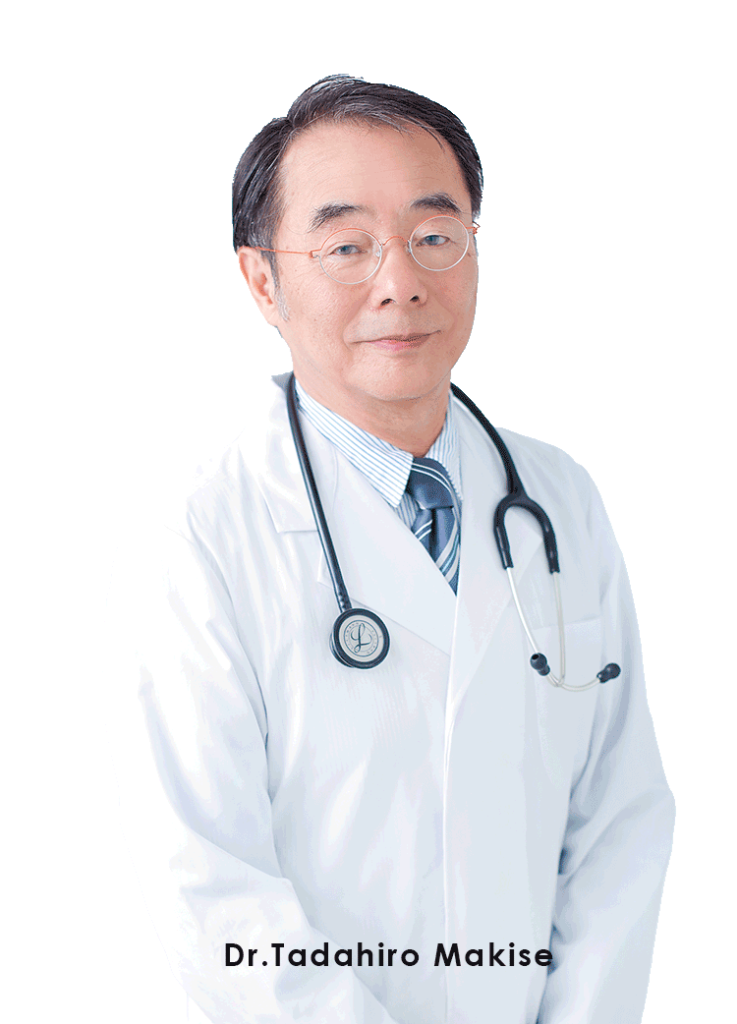
We deliver products that you can continue to use with peace of mind.
For three decades, our distinguished director, Dr. Makise, has traversed over 85 countries, passionately studying natural substances to bolster health. This journey culminated in the establishment of a clinic in Osaka, Japan. Here, Dr. Makise integrates his unique supplements with his extensive expertise, effectively treating numerous patients contending with intricate health challenges, both domestically and globally. From the forefront of medical innovation, we present products of unparalleled reliability, endorsed by countless users. We are dedicated to consistently delivering supplements that form a dependable cornerstone of your health regimen, safeguarding your well-being today and tomorrow.
If you heard that the nose of salmon heals your joints and skin, would you find it ridiculous? Maybe yes. But, surprisingly, now the Japanese researchers of Hirosaki University have proven that the nose of a salmon can heal your joints and skin.
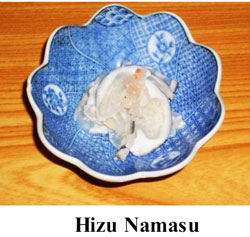 For more than 1000 years, in the northern provinces of Japan, including Hokkaido, Aomori, Iwate, and Niigata Prefecture, people eat salmon head as a delicacy to celebrate the New Year. The Japanese called this specialty as Hizu Namasu.
For more than 1000 years, in the northern provinces of Japan, including Hokkaido, Aomori, Iwate, and Niigata Prefecture, people eat salmon head as a delicacy to celebrate the New Year. The Japanese called this specialty as Hizu Namasu.
Due to its clear and transparent look, people call the nasal cartilage of salmon “Hizu” in Japan. “Hizu” in Japanese means ice head. The head of a raw salmon fish is thinly-sliced, soaked in salt and vinegar, and then mixed with julienned Japanese radish with seasonings.
The main component in the cartilage of salmon’s nose is Proteoglycan (PG), which is an effective supplement for joint and skin problems. Until a few years back, PG cost 30 million Yen (~ $250 thousand) to extract just 1g of PG from the salmon’s nose. While now, with the development of unique manufacturing and mass-production methods, the cost of PG is reasonable. It is now available as a health supplement.
What is Proteoglycan?
Proteoglycans (PG) are naturally-occurring glycoproteins in the human body. These proteins have glycosaminoglycans attached to the core protein. They make up a significant part of the extracellular matrix and maintain body tissues. It is a component that retains plenty of water like a sponge in articular cartilage and has a cushioning function. Hence, proteoglycan absorbs shock and impact.
What are Proteor-GII supplements made up of?
Our Proteor-GII uses the extract of salmon nasal cartilage. The entire processing from catching the fish to extraction takes place in Japan. Heretofore, it was challenging to isolate PG with high purity. Then, a research group of Hirosaki University in Japan developed a refining technology of high purity Proteoglycans on a large scale.
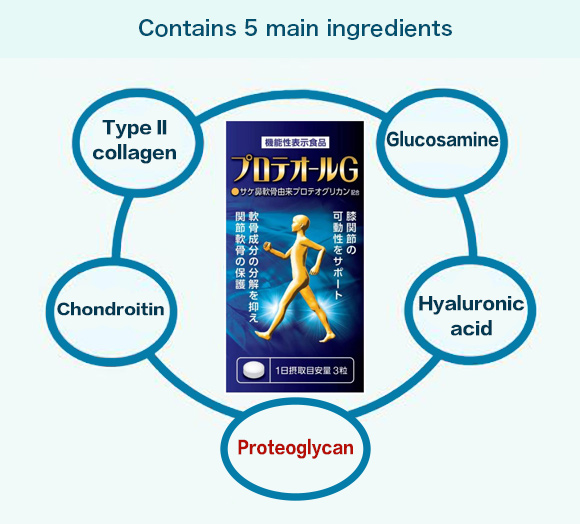
Health benefits of Proteoglycan
Did you know the human body has more than 200 bones? And more than 200 joints that connect these bones? Just imagine that these parts work together to allow us to walk, run, jump, eat, sleep, and perform all the activities in our life.
Your knees are the largest joint in the body. They bear a lot of weight and have a great responsibility for your ability to move. They also contain locomoting parts, from ligaments and cartilage to muscles and bones. These parts can become damaged either from injury or the natural wear and tear of age, making it problematic to stay active and do daily activities.
Proteoglycan is the main component contributing to the elasticity of the articular cartilage
Articular cartilage covers the ends of the long bones, where they come together to form joints. About 70% of the components that make up articular cartilage are water. The remaining 30% are type II collagen, proteoglycan, and hyaluronic acid.
Type II collagen maintains the structure of cartilage. Collagen is a protein that serves as the basis for the connective tissue of all organs. With aging, the production of collagen declines and leads to aging of the skin and joint problems.
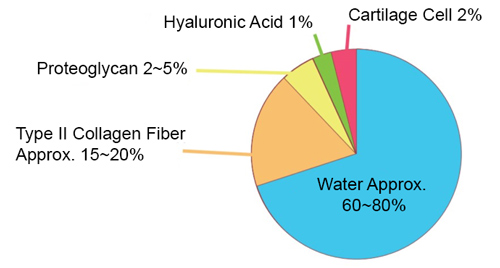
Composition of Articular cartilage
A large amount of PG in articular cartilage contains glycosaminoglycans (GAGs). Glycosaminoglycan chains have a moisture-holding function like a sponge. Due to its high water retention capacity, it plays a role in the stretching and bending of cartilage. Thus, PG has a cushioning effect and improves the function of joints.
Proteoglycan supports joint movement
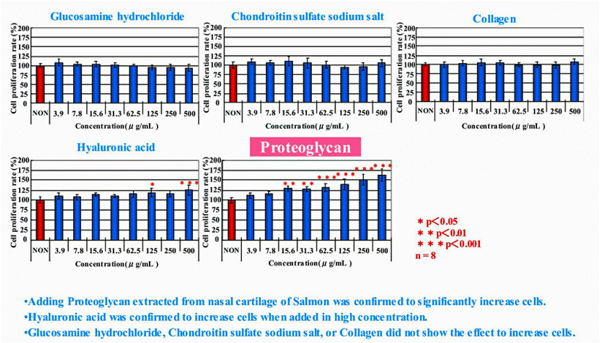
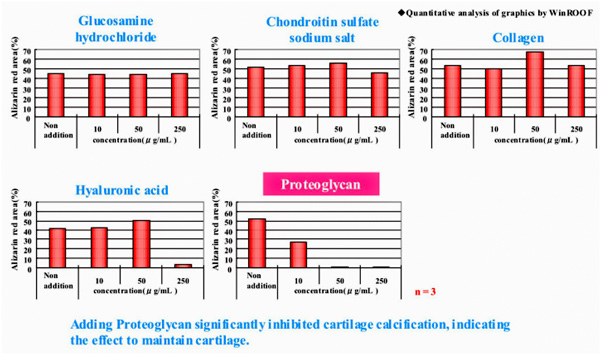
In one trial published in the Japan Pharmacology and Treatment journal, the randomized and double-blind study recruited 53 participants with knee osteoarthritis but otherwise healthy.
The study used the Japanese Orthopaedic Association (JOA) score to evaluate knee joint function. In this study, the assessment was on the basis of pain during walking, stair climbing, and swelling. This study confirmed that PG derived from salmon nasal cartilage could relieve pain and support joint health. The study also assessed safe intake and found no adverse effects of consuming proteoglycan.
http://www.pieronline.jp/content/article/0386-3603/45020/255
Proteoglycan supplement has shown promising benefits, especially in the case of osteoarthritis.
Osteoarthritis is the most common joint disorder. It occurs when the cartilage between two joints wears down. As an impact, the bones rub together and result in swelling and stiffness. The loss of PG from articular cartilage is a hallmark in the development of osteoarthritis. Moreover, with age, the PG undergoes a gradual decrease in the cartilage.
Proteoglycans reduce the risk of osteoarthritis. They significantly induce cartilage differentiation and suppress cartilage calcification and decomposition. These actions can have a positive effect in alleviating the symptoms of osteoarthritis.
Bertrand J., Held A. (2017) Role of Proteoglycans in Osteoarthritis. In: Grässel S., Aszódi A. (eds) Cartilage. Springer, Cham.
Along with joint health, Proteoglycan has several physiological functions
Proteoglycan is known to have epidermal cell growth (EGF) mimicking region on the C−terminal part of the core protein. Proteoglycan obtained from salmon nose cartilage also has a similar effect. In addition, PG also has the effect of promoting the production of hyaluronic acid and collagen.
The application test of Proteoglycan on human skin showed activities and functions to reduce wrinkles and boost skin elasticity. Proteoglycan promotes the growth of the epidermal cell and improves Type I Collagen and Hyaluronic acid.
In a randomized, double-blind, controlled study, the effect of ingestion of salmon nasal cartilage-derived Proteoglycan on skin condition in healthy adult volunteers was carried out. This study demonstrated the ability of ingested Proteoglycan to improve skin condition, including skin elasticity, wrinkles, pores, moisture, and smoothness. Thus, the results suggested the potential of salmon proteoglycan as a health supplement. https://www.eurekaselect.com/article/70300
In addition to this, Proteoglycan has an inflammation suppressing effect. It has direct and indirect interactions with various cytokines, growth factors, cell surface receptors, enzymes, and glycoproteins within the cell matrix.
Proteoglycan and its metabolites may exert anti-inflammatory actions via the suppression of inflammatory cytokine production. Consequently, they can have a preventive effect, especially against inflammatory diseases. This is for the reason that Proteoglycan is an effective supplement for osteoarthritis.
Other benefits of Proteoglycans
Proteoglycan as a health supplement has various health effects on the body:
- Has an antioxidant and firming effect on the skin.
- Suppresses the decomposition of cartilage components and protects articular cartilage
- Ideal for dry skins.
- Reduces pore sizes and eliminates stings after shaving.
- Stimulates the synthesis of collagen and hyaluronic acid.
- Hydrates and moisturizes skin deeply.
- Supports joints movements such as bending and stretching
- Makes the cuticle of nails stronger.
- Provides nutrients to the extracellular matrix.
- Has an anti-inflammatory effect.
- Improves age-related skin problems by holding large amounts of moisture.
- Has a reparative effect and has wrinkle prevention action.
Is Proteoglycan different from Collagen or Hyaluronic acid?
Yes, they are different from Proteoglycan.
Collagen is a primary component of the cartilage and provides strength to the extracellular matrix. It is responsible for the tightness, firmness, proper humidity, elasticity, and constant renewal of skin cells.
Hyaluronic acid forms a water-soluble gel. It is a structural component of articular cartilage and is responsible for skin smoothness. Hyaluronic acids make the extracellular matrix more flexible.
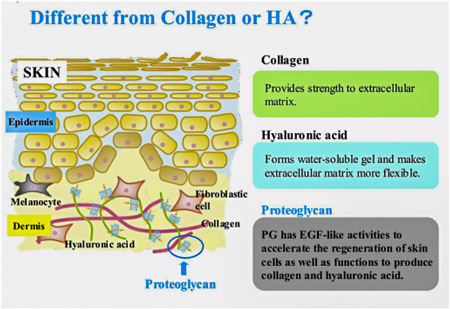
Proteoglycan has EGF-like activities to accelerate the regeneration of skin cells. In addition, it has functions to synthesize Collagen and Hyaluronic acid. PG has 30% more ability to preserve water than Hyaluronic acid. Because the molecular weight of PG is smaller than that of Hyaluronic acid, it penetrates deeper into the skin.
Should I take Glucosamine for my osteoarthritis?
Glucosamine is a glorified supplement for osteoarthritis because of its effectiveness. Our body utilizes its metabolic product as a part of glycosaminoglycans (hyaluronic acid). Therefore, if you take Proteoglycan, you don’t need to take Glucosamine.
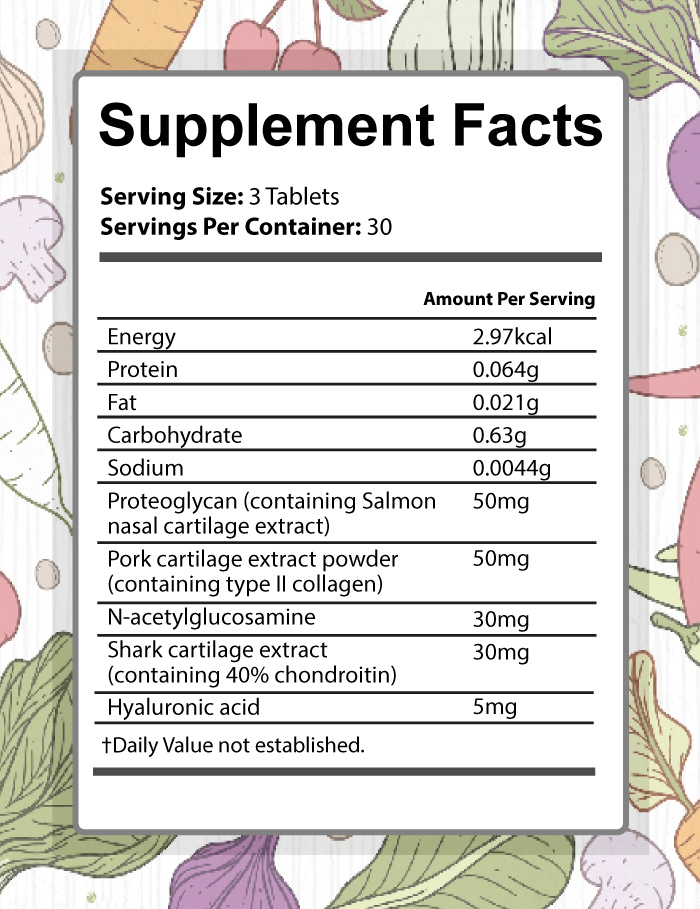
Other Ingredients
Crystalline cellulose, Calcium stearate, Fine silicon dioxide, Maltitol
Package Quantity
90 tablets
Suggested Use
3 tablets daily with water, or chew as it is.
Caution
⁃ Consult with a licensed physician, pharmacist, naturopath, or other qualified healthcare professional prior to taking dietary supplements.
⁃ Consult your healthcare practitioner if you are under the age of 18, have a medical condition, or are pregnant, lactating, or trying to conceive. Keep out of the reach of children. Store tightly closed in a cool place, dry place.
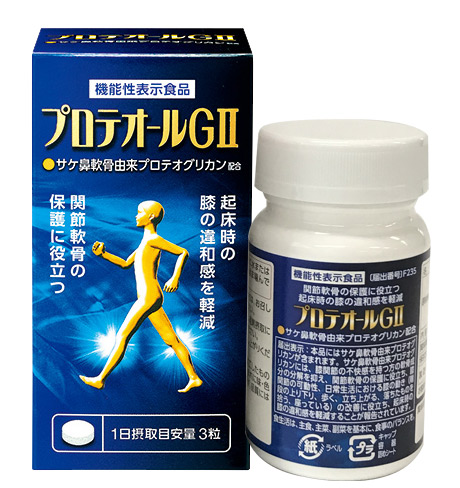
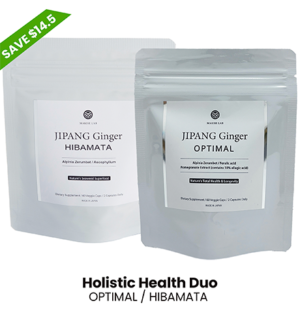
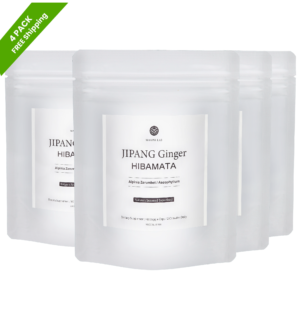
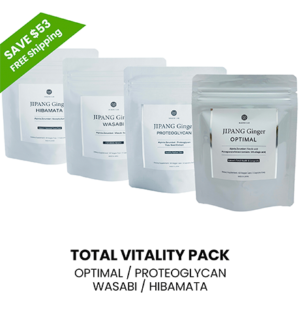
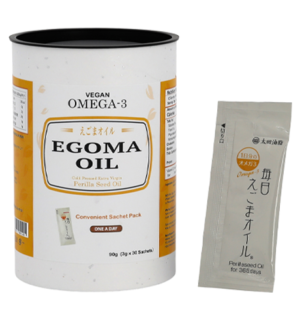
Reviews
There are no reviews yet.